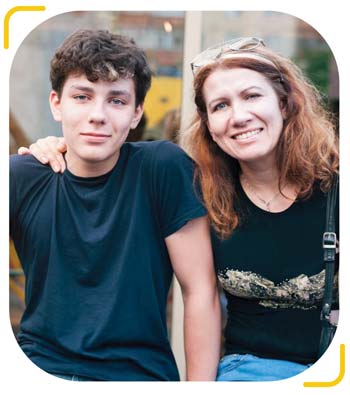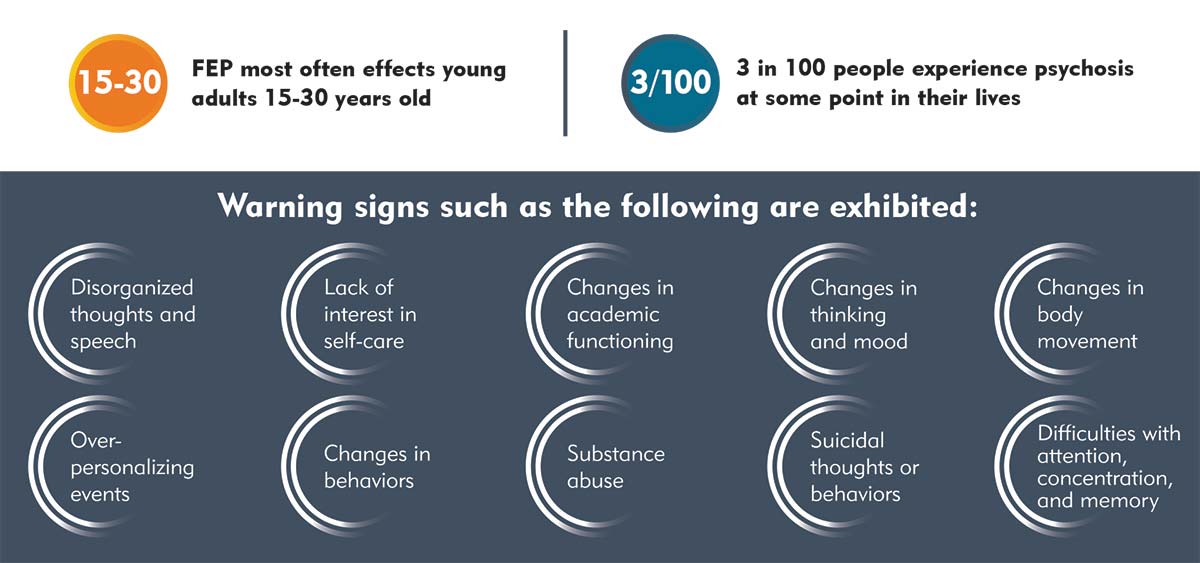Early Psychosis Care
IDENTIFY | TREAT | RECOVER

First Episode Psychosis (FEP) can affect individuals of any age, gender, race, or cultural background. Psychosis is a cluster of symptoms affecting the way a person thinks, feels, and behaves. These symptoms make it difficult or impossible for a person to know what is real, to think clearly, to communicate, and to relate to others.
A first episode usually presents as a crisis for the individual experiencing the event and their family.
OPPORTUNITIES TO LEARN
Join Early Psychosis Care Missouri at events and trainings coming soon.
First Episode Psychosis (FEP) Summit
The FEP Summit, in partnership with the CIT Conference Leadership Forum, will offer information and education in partnership with law enforcement, first responders, and behavioral health partners to improve community responses to mental health crises. This provides a forum for effective community outreach to spread the message about FEP, with an emphasis on early identification to shorten the duration of untreated psychosis, creating the context for sustainable change.
Goals: reduce stigma, explore the need for continued involvement with the criminal justice system.
Early Psychosis Care Conference
We invite those with an interest in and commitment to early psychosis care to join us for Early Psychosis Care Conference 2023. Designed for professionals and practitioners treating early psychosis, those with lived experience, family members, researchers, and students, Missouri’s Early Psychosis Care Conference offers educational opportunities in early psychosis research and treatment. Drawing from current research and evidence-based practices, conference themes include but are not limited to, the voice of lived experience and peer specialist; diversity, equity, and inclusion; assessment, identification, and treatment. Missouri’s Early Psychosis Care Conference offers a forum in which to learn about best practices, current trends in research, network with peers, and implement new strategies, research, and trends into practice.
Objectives:
- Describe Early Psychosis Care (EPC) including signs, symptoms and response
- Discuss stigma associated with EPC and how to lessen its negative impact
- Examine current early psychosis research
- Review evidence-based practices for EPC assessment, identification and treatment
- Reflect on individual stories of EPC lived experience and examine how your role as a professional, family member, researcher and/or peer may be able to offer support and hope
First Episode Psychosis (FEP) Spring Training
The Missouri Department of Mental Health provides the Spring Training Institute for staff, providers and consumers of the Division of Behavioral Health and the Division of Developmental Disabilities. Additionally, the Institute attracts staff from the Department of Corrections, Department of Youth Services, Department of Family Services, other statewide organizations and individuals in private practice. The Institute brings over 1,000 behavioral health professionals together to learn about the latest research in the field regarding medications, evidence-based treatment, and other issues related to the populations served. There are two full days of presentations and workshops with over 60 separate sessions that will broaden knowledge and enhance the understanding of the critical services provided to the citizens of Missouri.
Topics:
- Screening and Diagnosis
- What is not psychosis?
- Prevalence of Psychosis Spectrum disorders in Missouri
Psychosis 101 Training
May 25, 2023
9 a.m. to 10:30 a.m. PST
11 a.m. to 12:30 p.m. CST
Consultants: Grace Lee, Ph.D., Jenae Richardson, Psy.D., Shannon Pagdon
Description: Provide 1.5 hours virtual training that will include a screener and discussion of the screening process. Assist providers in learning how to talk to clients and families about possible psychosis symptoms as well as understand the importance of early intervention and treatment. Provide a brief overview of diagnostic criteria, describe the threshold for attenuated versus full psychosis, and discuss role of culture and trauma, the importance of good therapeutic rapport, and emphasize educating referral sources. Virtual format and recorded.
- Identify symptoms of psychosis and ways to screen them, and describe the role of culture and trauma in psychosis
- Recognize the importance of early intervention and treatment
- Acquire techniques for developing good therapeutic rapport with program participants and modeling good language awareness in clinical work
- Demonstrate best practices for communicating with program participants and families about psychosis and its symptoms and educating referral sources
Connecting individuals to appropriate interventions can reduce hospitalization, decrease the trauma and severity of symptoms, and can help maintain social support and families’ involvement which aids in a person’s recovery.

Contact Us
One University Blvd.
B207 Benton Hall
St. Louis, MO
